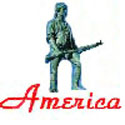Remember
Gulf War One?
Still liberated: an
exception to harsh religious uniformity.
BY DOUG BANDOW
Friday, August 16, 2002 12:01 a.m. EDT
KUWAIT CITY--The outdoor souk offers everything from cosmetics to electronics to sandals. Hanging prominently is a prayer rug with the Christian nativity scene woven into it. The Christ child smiles down upon Kuwaiti traders as the Muslim call to prayer blares in the background.
Its all sounds improbable, I know. We are often reminded these days of how restricted religious worship is in the Arab world. Evangelical activity in Saudi Arabia, for instance, can earn a foreigner prison time; death rewards the Christian convert. Last year, 14 Ethiopian and Indian Christians were jailed and then expelled from Saudi Arabia for worshipping in their homes. But one exception is Kuwait, the country we liberated in the first Gulf War and a country that remains keenly interested in the possibility of a second.
Barely a block from my hotel here, on a major street, sits a Catholic and a Coptic church, the Egyptian branch of Orthodoxy. There is a "very big Christian community" in Kuwait, says Msgr. Francis Micallef, a Carmelite bishop who presides over the Catholic church. Religious leaders put the number of observant Christians at roughly a quarter-million.
The first Carmelite arrived in 1947, to minister to foreign workers of the Kuwait Oil Co. Today's Holy Family Cathedral in the Desert was constructed in 1961. During services the area surrounding the church is alive with cars circling and parishioners streaming by. "We are free to have all our activities within the church and the church compound," says Msgr. Micallef. And there is no mistaking the facility: Three large crosses are imbedded in the building, visible to anyone who drives or walks by.
St. Mark's Coptic Church is smaller but also busy. The Rev. Theophane Anba Bishoy and two other priests run multiple services on any given day.
Nearby sits the National Evangelical Church, a sprawling complex with brick and stucco buildings and a large parking lot. It includes 15 different nationalities, ranging from English to Nepalese to Korean to Arab. The church is an "umbrella to every congregation," explains the Rev. Rafik Farouk, an Egyptian pastor. It feels almost Western, even peddling what seems like Christian kitsch. The Bible Society in the Gulf Bookstore mixes Bibles, study guides and devotional tapes with key chains, pens, mugs, baseball caps and "Left Behind" videos. Business was brisk when I stopped by.
![]()
As for intimations of terror, a poster at the National Evangelical Church warns members to be alert and to "maintain a low profile as much as possible." Indeed, Kuwaiti cleric Sulaiman Abu Ghaith turned up as a spokesman for Osama bin Laden. But his activities were shocking precisely because his case was so unusual. All told, "we have very good relations with the authorities," says Msgr. Micallef. "We feel that we are . . . not only respected but also welcomed."
In general, Christians do not fear the government. In Father Bishoy's office are photos of the emir and other Kuwaiti officials. On Mr. Farouk's wall is a photo of an ecumenical delegation meeting a cabinet minister.
![]()
For a faith built on Christ's admonition to make disciples of all the nations, this is no small concession. We are to minister to "Christian people only," acknowledges Mr. Farouk. "But any man can come here to ask, and we will respond." The back of the church's welcome sign, seen only by those leaving the compound, cites Mark 16:15: "Go into all the world and preach the Gospel to every creature."
Mr. Bandow is a fellow at the Cato Institute.
Used with permission from OpinionJournal.com, a web site from Dow Jones & Company, Inc.
